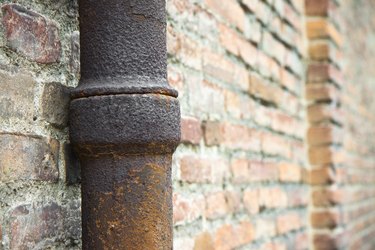
Maintaining cast iron pipes can be one of the challenges of living in an old house since these pipes are common in pre-1980s homes. There might be decades worth of debris, rust, and mineral buildup inside your cast iron pipes by the time you clean them out. Descaling cast iron pipes allows water to flow freely so you don't get any smelly drain backups, but there's a reason builders don't commonly use cast iron pipes anymore. They're prone to corrosion and tricky to keep clean, so this might be a project that requires some professional help.
The Wrong Way to Clean Cast Iron Pipes
Video of the Day
It's not a great idea to use chemical drain cleaners in metal pipes because they can do more harm than good as cast iron pipe cleaners. Many liquid drain cleaners, such as Drano, are made with caustic ingredients, including sodium hydroxide. These chemicals help break down clogs but can also corrode metal pipes.
Video of the Day
If there are any clogs in your old cast iron pipes and you pour a caustic cleaner down the drain, the liquid may be blocked by the clog and may have time to weaken the metal because the cleaner is stuck in one place instead of running freely through the pipe. Even if a caustic liquid cleaner claims to be safe for metal pipes, your plumber would probably advise against using it.
DIY Ways to Clean Cast Iron Pipes
Whether it's a clog or years of mineral deposits (or both) causing your pipes to drain slowly, there are a few things you can try that might open them up without causing damage.
First, you may see some short-term benefits from using an enzyme drain cleaner to clear out blockages in cast iron pipes. Unlike caustic chemical cleaners, enzymatic cleaners use bacteria to eat through organic material and break up clogs. This kind of cleaner shouldn't damage cast iron; however, it also won't help much if your pipes are constricted because of rust and mineral deposits.
The safest and most effective way to descale your own cast iron pipes is by using a sewer jetter kit connected to a pressure washer. This kind of kit has a long hose and a nozzle with multiple holes. When the hose and nozzle are connected to the power washer and fed through your pipes, the high-pressure jets of water forced through the nozzle should clear away at least some of the deposits and debris.
However, there's some risk to doing this yourself. For one thing, if the pipes are badly corroded, using pressurized water could create cracks and further damage.
The Professional Approach
Ultimately, descaling cast iron pipes may require hiring a plumber, especially if the pipes haven't been cleaned in many years. You'll also need a professional's help if your pipe issues are located in the main sewer line as opposed to the drain in your bathroom or kitchen sink. Don't pour any drain cleaner into your plumbing system and hope for the best; call a plumber who can send a camera into your pipes to get a look at the damage before making a plan.
A plumber might use hydrojetting to clean pipes with powerful jets of pressurized water. For severe buildup, plumbers can use a special kind of tool with spinning chains that forces everything out of the pipe and is safe for use with cast iron. This method is also preferable to hydrojetting in areas affected by drought, as it deep cleans drains without using any water.